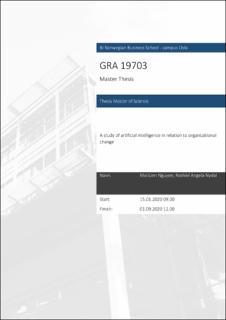| dc.description.abstract | The pace of change in the evolving business environment has never been higher, and
as a part of the broader automation movement, artificial intelligence (AI) will have a
fundamental impact on the way we do business. This thesis aims to gather knowledge
of how AI is influencing change management and organizational changes. A
conceptual model based on the research question and the theoretical review is
developed, consisting of the following categories: goals and strategy, engagement,
and impact, and reactions. The model serves as a starting point for this thesis and the
data collection. Thus, this thesis aims to gather knowledge of how artificial
intelligence is influencing change management and organizational changes, mainly
how factors such as goals and strategy, engagement, and impact, and reactions
influence the effect of change concerning digitalization within artificial intelligence.
To explore and examine our research problem, we conducted a qualitative study with
explorative research design and in-depth interviews as a method. We did a pre-project
to gain more information, understanding, and progress about the topic in general. The
study is conducted at two different companies, Claims Link, an independent
settlement company, and Aibel, a leading service company within oil, gas and
offshore wind industries. We wanted to gain insight into the implementation of a
digital co-worker called “Sødde” at Claims Link, and the implementation and
development of a logistic based AI system called Master Material Data (MMD) at
Aibel.
The findings indicate that focusing on goals and strategy and engagement might
succeed in having motivated and committed employees and positive reactions and
emotions, and further resulting in positive effects regarding the implementation of
digitalization within artificial intelligence. Thus, this study provides insight into
change management and the broader automation movement and the implementation
of artificial intelligence. Theoretical and practical implications and limitations are
also discussed. | en_US |
